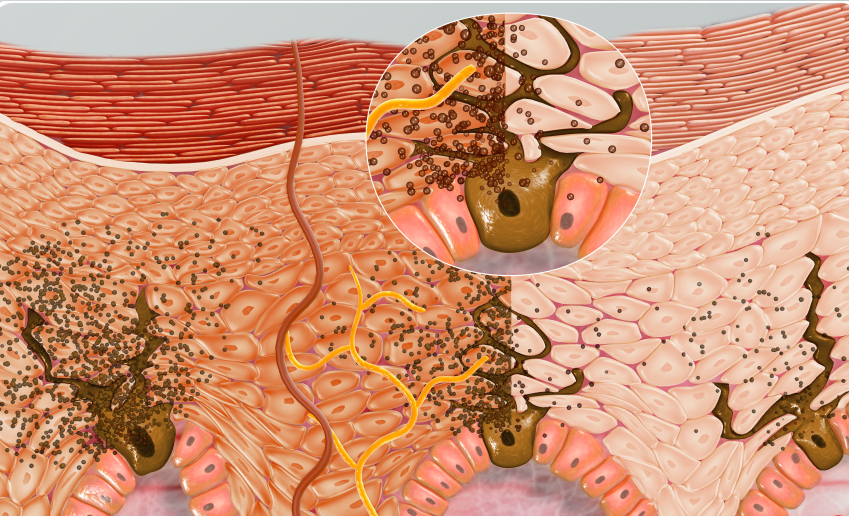Melanocytes insert granules of melanin into specialized cellular vesicles called melanosomes which are then transferred into the keratinocyte cells of the human epidermis. Melanin production often results in the tanning of the skin. Melanin absorbs over 99.9% of the UV radiation and thereby reduces the risk of DNA damage which may lead to cancer. However, people with certain conditions like albinism lack normal melanin production. This puts them at greater risk when it comes to exposure to the UV radiation. Sunscreen and other cosmetics are used to minimize such risks. But now researchers at the University of California, San Diego have come up with a better way to deal with this issue.
Melanin in human skin
(Source: home-remedies-for-you.com)
It has been known for many years that polymers of dopamine, a signalling chemical found in the brain, in many situations behave like a synthetic form of melanin. Scientists produced polydopamine nanoparticles by bathing the dopamine molecules in an alkaline solution. These dopamine-based polymers are now melanin-like nanoparticles. Further, when in a Petri-dish containing human keratinocytes these synthetic nanoparticles were added, it was found that the keratinocytes not only took them up but even distributed them around its nuclei like natural melanin.
“We had no idea if these nanoparticles would behave similarly to natural melanin, so the fact that they were broken down and smeared around the nucleus was a pleasant surprise,” said the leading chemist Nathan C. Gianneschi. The researchers exposed these cells to UV radiation for about 3 days and about 50% of the cells survived compared to the 10% survival in the negative controls (Source: cen.acs.org).
Further research would be required to understand the mechanism of the polydopamine nanoparticles absorption by the Keratinocytes. Understanding this mechanism could help in designing topical agents to prevent UV-related damage. On a lighter note, this agent might even be used by the cosmetic industry to fulfil the desire of people who wish to have darker skin!
Reference:
1] www.scientificamerican.com/article/synthetic-ldquo-melanin-rdquo-could-act-as-a-natural-sunscreen/
2] cen.acs.org/articles/95/web/2017/05/Artificial-melanin-gets-into-the-skin.html










